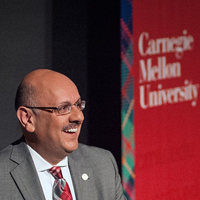
Jahanian Appointed Interim President of Carnegie Mellon University
CRA Board Member Farnam Jahanian was recently appointed Interim President of Carnegie Mellon University.
The CRA Bulletin frequently shares news, timely information about CRA initiatives, and items of interest to the general community.
Subscribe to the RSS feed to stay connected.
Information on activities relevant to researchers.

CRA Board Member Farnam Jahanian was recently appointed Interim President of Carnegie Mellon University.
The ACM International Computing Education Research (ICER) Conference will hold a workshop on Research on Learning about Machine Learning Organizers: Ben Shapiro (University of Colorado Boulder) Peter Norvig (Google) Rebecca Fiebrink (Goldsmiths University of London) When: Monday, August 21, 2017 09:00-17:00 Machine learning is transforming many areas of computer science. From natural language processing and search […]
The third New Computing Faculty Workshop will be held August 6-8, 2017 in San Diego. The goal of the workshop is to help computing faculty at research intensive universities to be better and more efficient teachers. By learning a little about teaching, we will help new faculty (a) make their teaching more efficient and effective (e.g., students learn more with less input time from faculty) and (b) make their teaching more enjoyable. The workshops were described in Communications of the ACM in the May 2017 issue.
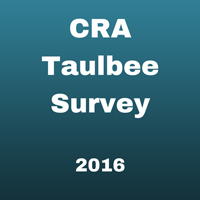
This article and the accompanying figures and tables present the results from the 46th annual CRA Taulbee Survey.
Today, more than 50,000 high school students will take the inaugural Advanced Placement Computer Science Principles (AP-CSP) exam. Ruthe Farmer, former senior policy advisor for Tech Inclusion in the White House explains why this is such a significant milestone for computer science education in an article in the Huffington Post.
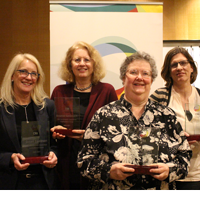
At the CRA board meeting in February, Executive Director Andrew Bernat presented members of the CRA Enrollment Committee: Institution Subgroup with glass awards to thank them for their service on the project, which spanned nearly two years. Former CRA Board Member Tracy Camp leads the CRA Enrollment Committee.
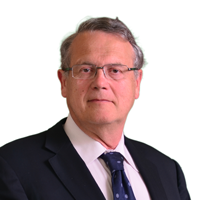
Mitsubishi Electric Research Labs (MERL) is the North American subsidiary of the corporate research and development organization of Mitsubishi Electric Corporation and a Lab and Center member of CRA.
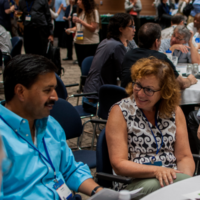
Over the past few months, CRA and its committees have been actively promoting our mission areas of policy, leadership, and talent development.
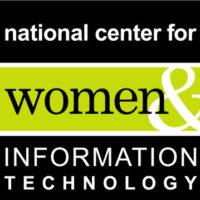
Thanks to the continued support from sponsors, the NCWIT Academic Alliance (AA) is pleased to announce the call for nominations and proposals for the latest round of awards.
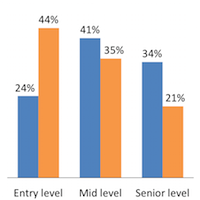
CERP recently extracted Web data to observe the career progression of women who had participated in the CRA-W’s 2008 or 2009 Career Mentoring Workshops (CMWs) compared to a sample of women who had never participated in CMWs. We obtained the comparison sample from a population of women who earned their Ph.D.s in computer science during the same time period as the participants. We collected current career information including job titles (e.g., associate professor) and job setting (e.g., academia vs. industry/labs) for both groups. We then categorized job titles as entry level (e.g., assistant professor, software engineer), mid level (e.g., associate professor, senior engineer), and senior level (e.g., professor, principal program manager), collapsed across job setting. To test for a systematic difference in job rankings between workshop participants and the comparison group, we ran a 2 (Group) x 3 (Job Title Rank) Chi-squared test and found a statistically significant difference in rankings across the two groups, χ2 (2, N = 181) = 8.46, p < 0.05. Specifically, CMW participants were less likely than non-participants to be in an entry level position, p < .05, and more likely to be in a senior level position than non-participants, p < .05.
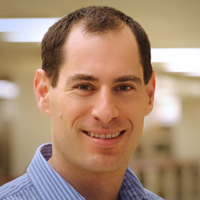
Since I started graduate school in 1997, I have considered myself a member of the programming languages research community — and I continue to attend and publish in the annual conferences of this vibrant computing subfield. But over the last 5-10 years, I have also found myself increasingly passionate about opportunities for computing researchers to focus on ways to influence computing education beyond, for those of us who are academics, our own classrooms and independent studies. Let me share some of the projects I have enjoyed (seriously!) and others I wish I had more time to pursue.
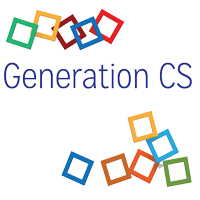
Generation CS: Computer Science Undergraduate Enrollments Surge Since 2006 Across the United States and Canada, universities and colleges are facing a significant increase in enrollment in both undergraduate computer science (CS) courses and programs. The current enrollment surge has exceeded previous CS booms, and there is a general sense that the current growth in enrollment […]
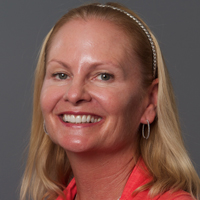
My research revolves around tracking and understanding users’ emotional states and leveraging that information as additional context for the design of emotionally sentient systems. Some of the systems we have built have been designed for a user’s own personal reflection. Our first application, AffectAura, provided users with their own behavior patterns over time, such as what they were doing, where they were, who they were with and how they felt. This information could be used to make personal decisions about behavior change—if certain activities usually result in your feeling good or bad, perhaps you want to increase or decrease those behaviors.
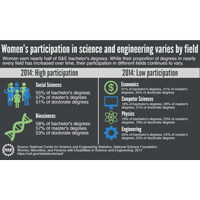
Yesterday, the National Center for Science and Engineering Statistics (NCSES) announced the release of the 2017 Women, Minorities, and Persons with Disabilities in Science and Engineering (WMPD) report, the federal government’s most comprehensive look at the participation of these three demographic groups in science and engineering education and employment.
CRA brings together people from academia, government labs, and industrial labs. For me, coming from industry, Snowbird is an unbeatable opportunity to take the pulse of academia. One of the hot topics in 2016 was the Data Science juggernaut. I was glad to join Barbara Ryder (Chair) and Lise Getoor (Co-Chair) in organizing the panel session: Data Science in the 21st Century, which was well attended and full of energy and ideas. After CRA’s Committee on Data Science (Lise Getoor, Chair, David Culler, Eric de Sturler, David Ebert, Mike Franklin, and H.V. Jagadish) published the bulletin article Computing Research and the Emerging Field of Data Science, David Culler and I sat down for a follow-up chat: A Conversation on Data Science.
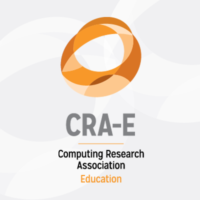
The Computing Research Association’s Education Committee (CRA-E) is pleased to announce the “Undergraduate Research Listing Service.” This free service is now available for faculty and other researchers to advertise undergraduate research opportunities and for undergraduates to find such opportunities. The site can be found here: http://conquer.cra.org/research-opportunities.
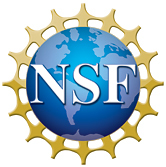
The NSF Directorate for Computer & Information Science & Engineering (CISE) will host a one-day workshop on CAREER Proposal Writing on March 20, 2017. This workshop will be held at the Hilton Arlington, near the National Science Foundation. The goal of this workshop is to introduce junior CAREER-eligible faculty to the NSF CAREER program and help them to prepare their CAREER proposals to target CISE programs. Attendees will have the opportunity to improve their skills in proposal writing, as well as to interact with NSF program directors from different CISE divisions (ACI, CCF, CNS, and IIS) and recent NSF CAREER awardees.
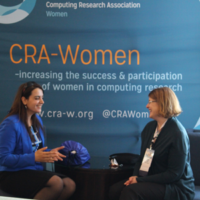
CRA-Women invites nominations for the Borg Early Career Award (BECA). he award honors the late Anita Borg, who was an early member of CRA-W and is inspired by her commitment to increasing the participation of women in computing research.

Microsoft is a Lab and Center member of CRA. This article is the second in a series of our industry member profiles.
Jeannette M. Wing joined Microsoft Research in January 2013, after holding positions in academia and government, most recently at Carnegie Mellon University and the National Science Foundation (NSF). From 2007 to 2010, she served as assistant director of the Computer and Information Science and Engineering Directorate at the NSF. Wing is a former CRA board member and recipient of the 2011 CRA Distinguished Service Award. Her areas of expertise are in trustworthy computing, formal methods, concurrent and distributed systems, programming languages, and software engineering.
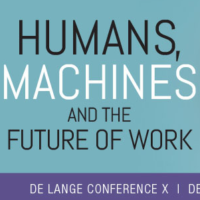
CRA recently was a sponsor and participated in the De Lange Conference on Humans, Machines, and the Future of Work, which focused on the impact of the amazing technologies being developed by the computing research community on the nature of work and employment. The conference was held at Rice University with primary funding from the De Lange Conference Fund at Rice, which brings top experts and major figures to its campus in order to focus on a topic of great concern to society.
2017 Election Committee’s Slate of Nominees for the CRA Board
CRA is pleased to announce the 2017 Election Committee’s slate of nominees for the CRA Board.
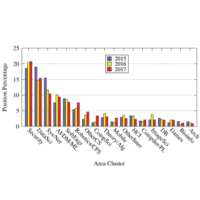
The wealth of faculty searches in Computer Science during this hiring season for positions starting in 2017 again affords the opportunity to study areas of Computer Science where departments are choosing to invest in new faculty hires. While the number and areas for faculty searches does not necessarily translate into the same for faculty hires, we believe that they provide insight into current and future needs within the discipline.
We analyzed ads from 347 institutions seeking to fill hundreds of tenure-track faculty positions in Computer Science. There is a 30% one-year (and 56% two-year) increase in the number of institutions searching for tenure-track faculty in Computer Science and a 35% one-year(and 71% two-year) increase in the number of positions being searched for. The number of institutions searching and positions seeking to be filled has increased even more for non-PhD-granting institutions.
Today, more than ever, industry leaders are looking to partner with academic computer science programs. With available computer science expertise at a premium, they’re looking for ideas, for new hires, for help on crucial projects. Universities are the mother lode for the personnel and expertise they crave. On July 18, I presented at the CRA Conference at Snowbird session, “Local Corporate Labs, Centers and Development Offices: Optimizing Department/Industry,” which explored the growth of corporate lab culture, and I’d like to share some of insights from that talk.

The CRA Education Committee (CRA-E) hosts a series of workshops on Engaging Undergraduates in Research at major computer science research conferences. The next workshop titled “Best Practices in Mentoring Undergraduate Research in Supercomputing,” will be held at Supercomputing 2016 in Salt Lake City, Utah. The workshop will run as BoF session on Wednesday, November 16, 5:15-7 pm and is run by Nancy Amato (Texas A&M) and CRA-E Fellow Max Grossman (Rice University).
Last July, a distinguished panel of computer scientists – David Culler (UC Berkeley), Rayid Ghani (U of Chicago), Rahel Jhirad (Hearst) and Rob Rutenbar (UIUC) — discussed this question with a group of approximately 100 CRA Conference at Snowbird attendees. There was agreement that data science is an interdisciplinary field, combining techniques from machine learning, natural language processing, data mining, algorithms, information retrieval, etc.

CRA’s newest award program honors faculty members in computing who have made a significant impact on students they have mentored. The CRA-E Undergraduate Research Faculty Mentoring Award recognizes faculty members who have provided exceptional mentorship and undergraduate research experiences and, in parallel, guidance on admission and matriculation of these students to research-focused graduate programs in computing.
Our ability to collect, manipulate, analyze, and act on vast amounts of data is having a profound impact on all aspects of society. This transformation has led to the emergence of data science as a new discipline. The explosive growth of interest in this area has been driven by research in social, natural, and physical sciences with access to data at an unprecedented scale and variety, by industry assembling huge amounts of operational and behavioral information to create new services and sources of revenue, and by government, social services and non-profits leveraging data for social good. This emerging discipline relies on a novel mix of mathematical and statistical modeling, computational thinking and methods, data representation and management, and domain expertise. While computing fields already provide many principles, tools and techniques to support data science applications and use cases, the computer science community also has the opportunity to contribute to the new research needed to further drive the development of the field. In addition, the community has the obligation to engage in developing guidelines for the responsible use of data science.
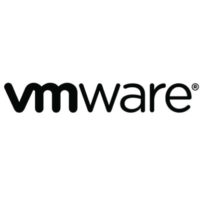
We are pleased to announce a new award in support of the computer science research community. The objective of this award is to call attention to a valuable and promising body of emerging computer science systems research and provide support for continued advances by an emerging research leader. This will be an annual award in the amount of USD 100,000, granted to the recipient’s university in support of her/his research.
Eligible nominees are faculty worldwide within 5 years of their first tenure-track appointment. Nominations must be submitted by a university department chair and each submission should include a one-page letter of nomination, a proposed citation and three references with contact information. Each department chair is limited to a single nomination which must be submitted via email at sysaward@vmware.com. The deadline for the nominations submission is November 15, 2016.
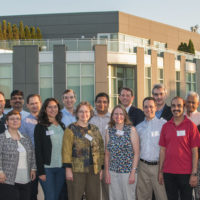
On September 14, 21 computing researchers from across the country visited Washington, D.C. to make the case before Congress for federally funded computing research. The volunteers, traveling from as near as Maryland and Pennsylvania, and as far away as Utah and California, participated in nearly 50 House and Senate meetings. Their message to Congress was very simple: Federally supported computing research is vital to the nation’s future. Using their own research and individual stories as support, and reinforced with additional information from CRA, they made the “Federal case” for computing to members of Congress and their staff. Just as important as the message they presented, they also made valuable connections with the officials who represent them in D.C. Those members now know more about the expertise and interesting (and important) computing work that occurs in their districts and states, and our participants have a better sense of just who represents them in Congress. And they’ve hopefully started a lasting dialogue on both sides.
First, the good news: the government won’t have to shut down on Saturday, as Congressional leaders have agreed to a continuing resolution (CR) through December 9. As our regular readers will remember, the Fiscal Year 2016 budget year runs from October 1, 2015 to September 30, 2016 and if Congress has not passed a budget or a CR by this Saturday October 1, federal agencies must stop operations. The last government shutdown happened back in 2013, but we’ve been dealing with the potential of one every year since. The agreed to CR puts funding for federal agencies generally, and science research accounts specifically, on autopilot at Fiscal Year 2016 levels.
